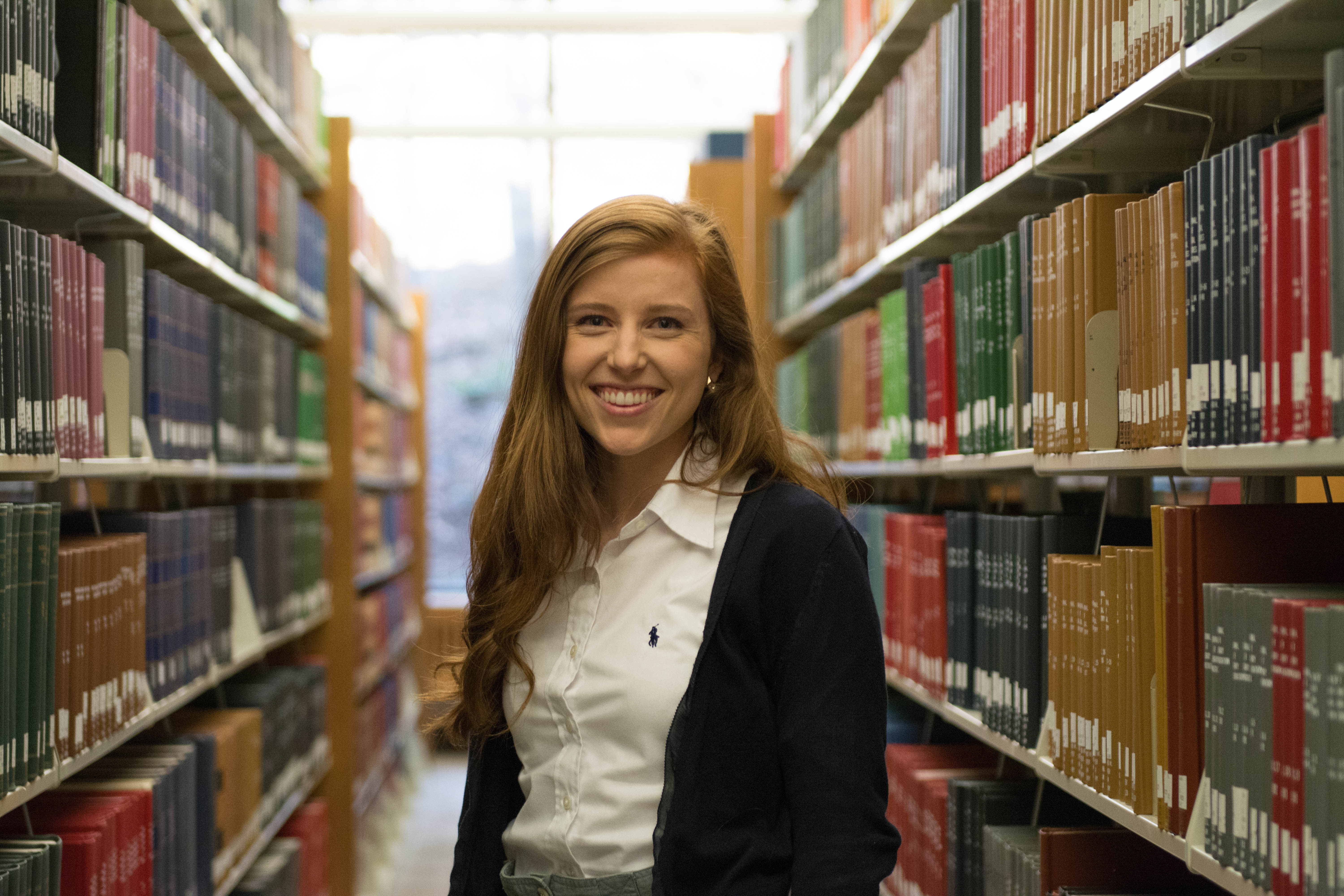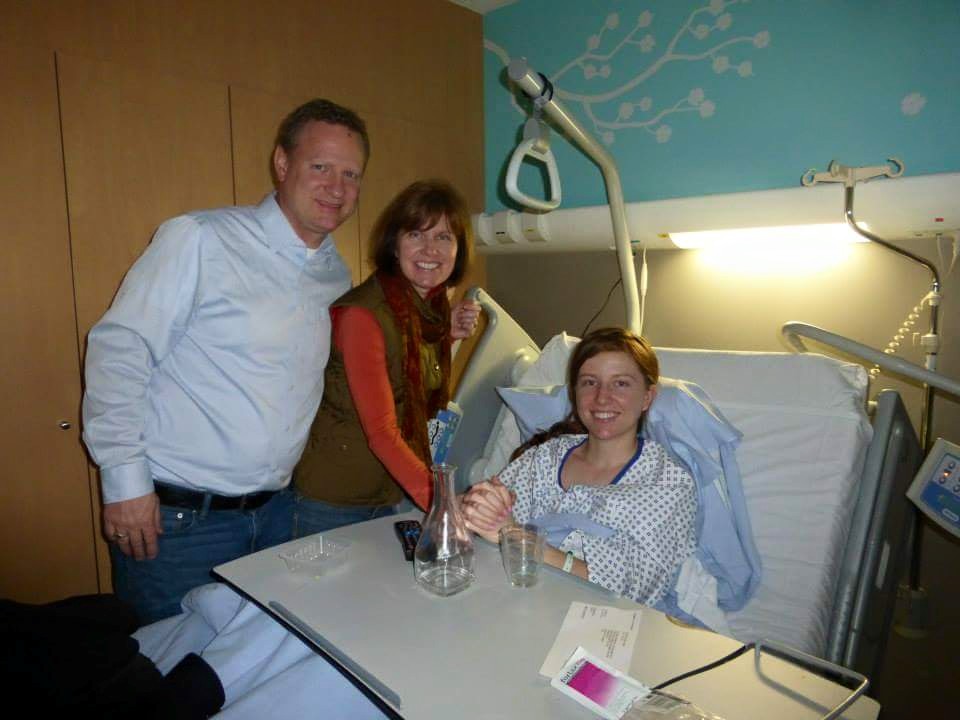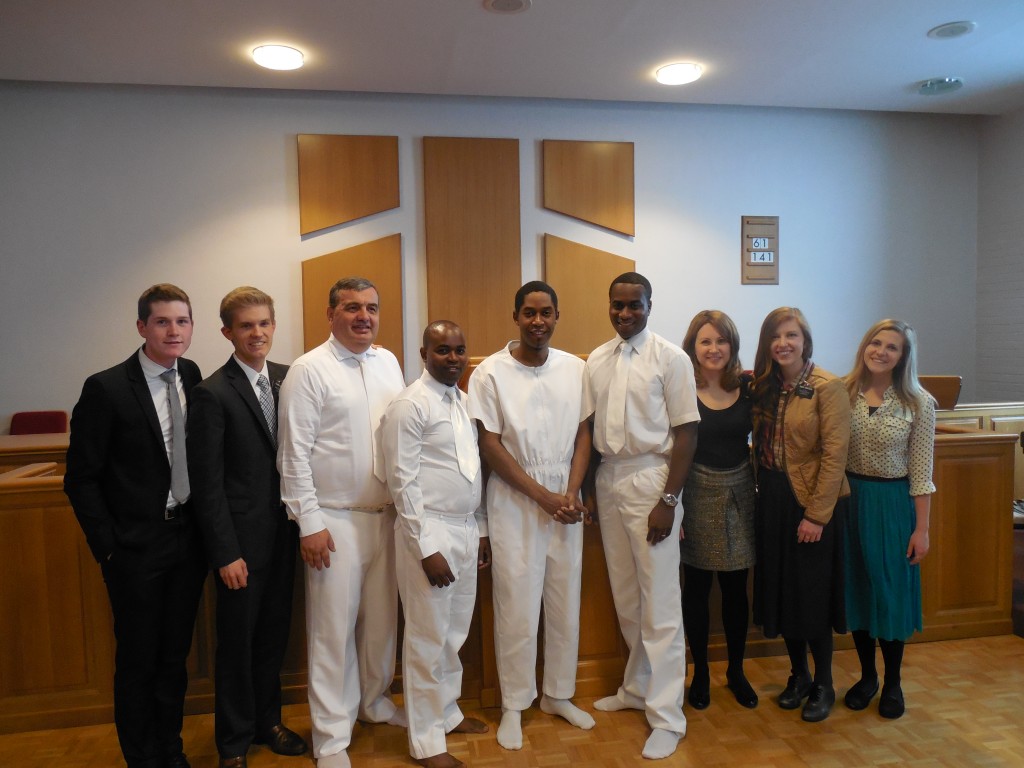She brought her family lots of gifts from her mission in Paris: clothes, caramels, paintings and trinkets. But Emily Anderson kept one souvenir all to herself.
She has an almost invisible scar beneath her hairline. It was once a violent red gash, but it slowly faded to a puckered pink mark and then a thin white line. It’s a reminder of the emergency brain surgery she had as an LDS missionary.

Press forward with a steadfastness in Christ
Anderson began to have crippling headaches in December 2013, about 11 months into her mission. She had just arrived in a new area called St. Quentin, 100 miles northeast of Paris.
Members said she was just having migraines. Some gave her pills; others urged her to visit the local doctor; the bishop gave her a priesthood blessing.
“He said that I would have the courage and faith to finish my mission,” Anderson said. “It was really surprising to me because I didn’t think there was anything wrong with me.”
Anderson and her companion, Hailee Henson, were printing baptismal programs at a church building one day when Anderson’s headache became particularly intense. Anderson vomited from the pain, and Henson called the mission nurse. The nurse instructed Henson to get Anderson to a hospital in Paris.
The emergency room doctors gave Anderson an IV and said there was probably something wrong with her eye. They asked her to come back in two days for an MRI, a precaution to make sure there weren’t further complications.
Mission president Franck Poznanski and his wife invited Anderson and Henson to stay with them while waiting for the return trip to the hospital. The sister missionaries went to the mission home, and President Poznanski tried to help by ordering lots of Domino’s Pizza.
“As I was saying my prayers that (first) night, I felt prompted to thank the Lord for sparing my life,” Anderson said. “Everyone kept telling me, it’s just migraines, or it’s just something wrong with your eye, or something like that. So that really took me by surprise.”
The MRI became more than just a precaution. It was how the doctors discovered a cyst in Anderson’s brain, blocking fluid from draining properly. An ER doctor informed her she needed surgery right away, then gave her his phone so she could call her parents.
Everything became hectic. Henson called the mission president and his wife, who came to the hospital immediately.
“Emily was bawling when she came out of her MRI, and then I called the Poznanskis,” Henson said. “They came rushing into the hospital. I’ll never forget it because it was just like a movie.”
Anderson thought she could return to the United States for her surgery, but her doctors wouldn’t even let her board a plane. They loaded her into an ambulance and took her to a hospital specializing in neurosurgeries. Sister Poznanski joined Anderson in the ambulance, but Henson wasn’t allowed.
“That was the last time I saw Emily for months,” Henson said. “And I didn’t realize how big of a deal it was. Everyone told me she was going to be okay, but then the Poznanskis told the missionaries months later that they were afraid she was going to die.”
Sister Poznanski spent the ambulance ride reassuring Anderson everything was in God’s hands. Anderson had been taught that her entire life, but she wondered if it was true.
“That was the very first time where I doubted if God existed, because my whole world had just been turned around,” Anderson said. “And I still remember having that question in my mind, like, ‘Is this all real? Does anything really matter anymore? Does God exist?'”
She had a small Book of Mormon with her, and she held on to it when she arrived at the second hospital, even though the nurses took her other belongings.
“I made it up to my room, and I remember I had a teeny, tiny Book of Mormon, one of the little blue ones, and I remember just clutching it,” Anderson said. “I remember hoping for peace and hoping for perspective because although I was facing something really, really hard, I knew that I had the foundations of faith, and I knew that if the gospel was true, then that’s what was going to get me through it.”
Having a perfect brightness of hope
Anderson’s doctors scheduled her surgery for the next day, Dec. 20, 2013. The nurses washed and braided her hair, making Anderson feel like Katniss Everdeen from “The Hunger Games.” She resolved to be brave, then spent the night alone in her room. The nurses washed her hair again when she woke up.
“I remember feeling peace for the first time,” Anderson said. “I actually felt pretty calm and focused and like I knew everything was going to be okay.”
The surgery took hours, but it was successful. President and Sister Poznanski were with Anderson when she woke up, and her parents joined them later.
Anderson didn’t know it then, but her parents had made a pact on their way from their Seattle home to their daughter’s bedside in France. They promised that, if anything went wrong and she became handicapped, they would take care of her — together — for as long as she needed them.

“My parents were so frightened for me,” Anderson said. “But when I saw them, I recognized them, obviously, and I spoke to them, and then I turned to President and Sister Poznanski and started speaking in French, and at that moment, their fears were assuaged that I was going to be okay.”
The other missionaries also stood by Anderson’s side. President Poznanski sent a text message to all the companionships when he learned that Anderson needed surgery, asking them to fast and pray. Each missionary sent Anderson a get-well card during her hospital stay, and she read every single one.
Anderson spent six days in the hospital. She and her parents celebrated Christmas over McDonald’s hamburgers and potato wedges. Anderson had been looking forward to Christmas in a French family’s home for months, but she said the day was magical anyway.
“There was a lot of joy, and it was astonishing because you wouldn’t expect that,” Anderson said. “But my family was there, everything was okay, I was going to recover. I was doing great.”
Anderson didn’t need to relearn how to walk or speak or do anything else. She said her surgery and recovery reminded her of her mission scripture, 2 Nephi 31:20.
“What we really need to know is that we can have hope because of Jesus Christ and his atonement,” Anderson said. “Without that knowledge, I would have been so devastated by the whole thing. So instead I knew that everything was going to be okay. And I don’t think my hope was perfect, but the only way anyone could ever have a perfect brightness of hope would be because they know of Jesus Christ.”
And a love of God and of all men
The experience made Anderson’s prayers much more sincere, she said, and taught her to rely on God the way she would rely on her father.
“I felt like he was there, talking to me,” Anderson said. “He was so present, and my prayers became true conversations with him because I needed him so much. And that’s how I came to know God, in those moments.”
Anderson left the hospital and continued her recovery in the Paris area. Her parents stayed with her for a few weeks, and she was assigned to a new area in mid-January. She began training a new missionary in March, saw Henson on a transfer day and completed her mission in late May.

“The whole thing was a miracle, and I’m grateful I was a part of it,” Henson said. “I’ll remember it my whole life. It was an experience that would have converted anyone.”
Anderson graduated from BYU in April 2015 with a degree in American studies. She began law school at BYU during Fall Semester 2015 and joked that her classes are hard enough to rival brain surgery.
“After my mission, I’ve felt that there was a reason why my life had been spared,” Anderson said. “I knew that I had something that I had to do, and little bit by little bit, I’ve had experiences that have driven me to the law and doors that have opened.”
Anderson said she’s looking forward to the day when she can use her education to help other people.
“I don’t know what exactly I will do or what that will look like, but I know that I can make a difference through the skills I’m learning,” Anderson said. “Law school has shaped what direction my career will take, and I really hope that it’s toward making a difference in the world.”




